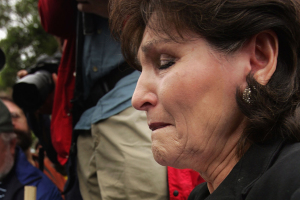State of the Union 2013 Transcript: President Obama's Full Speech Text
Now, most of us agree that a plan to reduce the deficit must be part of our agenda. But let's be clear: deficit reduction alone is not an economic plan. A growing economy that creates good, middle-class jobs – that must be the North Star that guides our efforts.
Every day, we should ask ourselves three questions as a nation: How do we attract more jobs to our shores? How do we equip our people with the skills needed to do those jobs? And how do we make sure that hard work leads to a decent living?
A year and a half ago, I put forward an American Jobs Act that independent economists said would create more than one million new jobs. I thank the last Congress for passing some of that agenda, and I urge this Congress to pass the rest. Tonight, I'll lay out additional proposals that are fully paid for and fully consistent with the budget framework both parties agreed to just 18 months ago. Let me repeat – nothing I'm proposing tonight should increase our deficit by a single dime. It's not a bigger government we need, but a smarter government that sets priorities and invests in broad-based growth.
Our first priority is making America a magnet for new jobs and manufacturing.
After shedding jobs for more than 10 years, our manufacturers have added about 500,000 jobs over the past three. Caterpillar is bringing jobs back from Japan. Ford is bringing jobs back from Mexico. After locating plants in other countries like China, Intel is opening its most advanced plant right here at home. And this year, Apple will start making Macs in America again.
There are things we can do, right now, to accelerate this trend. Last year, we created our first manufacturing innovation institute in Youngstown, Ohio. A once-shuttered warehouse is now a state-of-the art lab where new workers are mastering the 3D printing that has the potential to revolutionize the way we make almost everything.
There's no reason this can't happen in other towns. So tonight, I'm announcing the launch of three more of these manufacturing hubs, where businesses will partner with the Departments of Defense and Energy to turn regions left behind by globalization into global centers of high-tech jobs. And I ask this Congress to help create a network of fifteen of these hubs and guarantee that the next revolution in manufacturing is Made in America.
If we want to make the best products, we also have to invest in the best ideas. Every dollar we invested to map the human genome returned $140 to our economy. Today, our scientists are mapping the human brain to unlock the answers to Alzheimer's; developing drugs to regenerate damaged organs; devising new material to make batteries ten times more powerful. Now is not the time to gut these job-creating investments in science and innovation. Now is the time to reach a level of research and development not seen since the height of the Space Race. And today, no area holds more promise than our investments in American energy.
After years of talking about it, we are finally poised to control our own energy future. We produce more oil at home than we have in 15 years. We have doubled the distance our cars will go on a gallon of gas, and the amount of renewable energy we generate from sources like wind and solar – with tens of thousands of good, American jobs to show for it. We produce more natural gas than ever before – and nearly everyone's energy bill is lower because of it. And over the last four years, our emissions of the dangerous carbon pollution that threatens our planet have actually fallen.
But for the sake of our children and our future, we must do more to combat climate change. Yes, it's true that no single event makes a trend. But the fact is, the 12 hottest years on record have all come in the last 15. Heat waves, droughts, wildfires, and floods – all are now more frequent and intense. We can choose to believe that Superstorm Sandy, and the most severe drought in decades, and the worst wildfires some states have ever seen were all just a freak coincidence. Or we can choose to believe in the overwhelming judgment of science – and act before it's too late.
The good news is, we can make meaningful progress on this issue while driving strong economic growth. I urge this Congress to pursue a bipartisan, market-based solution to climate change, like the one John McCain and Joe Lieberman worked on together a few years ago. But if Congress won't act soon to protect future generations, I will. I will direct my Cabinet to come up with executive actions we can take, now and in the future, to reduce pollution, prepare our communities for the consequences of climate change, and speed the transition to more sustainable sources of energy.
Four years ago, other countries dominated the clean energy market and the jobs that came with it. We've begun to change that. Last year, wind energy added nearly half of all new power capacity in America. So let's generate even more. Solar energy gets cheaper by the year – so let's drive costs down even further. As long as countries like China keep going all-in on clean energy, so must we.
In the meantime, the natural gas boom has led to cleaner power and greater energy independence. That's why my Administration will keep cutting red tape and speeding up new oil and gas permits. But I also want to work with this Congress to encourage the research and technology that helps natural gas burn even cleaner and protects our air and water.
Indeed, much of our new-found energy is drawn from lands and waters that we, the public, own together. So tonight, I propose we use some of our oil and gas revenues to fund an Energy Security Trust that will drive new research and technology to shift our cars and trucks off oil for good. If a non-partisan coalition of CEOs and retired generals and admirals can get behind this idea, then so can we. Let's take their advice and free our families and businesses from the painful spikes in gas prices we've put up with for far too long. I'm also issuing a new goal for America: let's cut in half the energy wasted by our homes and businesses over the next twenty years. The states with the best ideas to create jobs and lower energy bills by constructing more efficient buildings will receive federal support to help make it happen.
America's energy sector is just one part of an aging infrastructure badly in need of repair. Ask any CEO where they'd rather locate and hire: a country with deteriorating roads and bridges, or one with high-speed rail and internet; high-tech schools and self-healing power grids. The CEO of Siemens America – a company that brought hundreds of new jobs to North Carolina – has said that if we upgrade our infrastructure, they'll bring even more jobs. And I know that you want these job-creating projects in your districts. I've seen you all at the ribbon-cuttings.
Tonight, I propose a "Fix-It-First" program to put people to work as soon as possible on our most urgent repairs, like the nearly 70,000 structurally deficient bridges across the country. And to make sure taxpayers don't shoulder the whole burden, I'm also proposing a Partnership to Rebuild America that attracts private capital to upgrade what our businesses need most: modern ports to move our goods; modern pipelines to withstand a storm; modern schools worthy of our children. Let's prove that there is no better place to do business than the United States of America. And let's start right away.
Part of our rebuilding effort must also involve our housing sector. Today, our housing market is finally healing from the collapse of 2007. Home prices are rising at the fastest pace in six years, home purchases are up nearly 50 percent, and construction is expanding again.
But even with mortgage rates near a 50-year low, too many families with solid credit who want to buy a home are being rejected. Too many families who have never missed a payment and want to refinance are being told no. That's holding our entire economy back, and we need to fix it. Right now, there's a bill in this Congress that would give every responsible homeowner in America the chance to save $3,000 a year by refinancing at today's rates. Democrats and Republicans have supported it before.
What are we waiting for? Take a vote, and send me that bill. Right now, overlapping regulations keep responsible young families from buying their first home. What's holding us back? Let's streamline the process, and help our economy grow.
These initiatives in manufacturing, energy, infrastructure, and housing will help entrepreneurs and small business owners expand and create new jobs. But none of it will matter unless we also equip our citizens with the skills and training to fill those jobs. And that has to start at the earliest possible age.




























